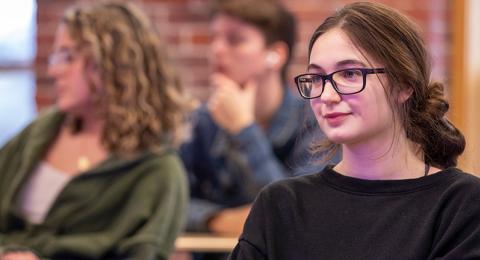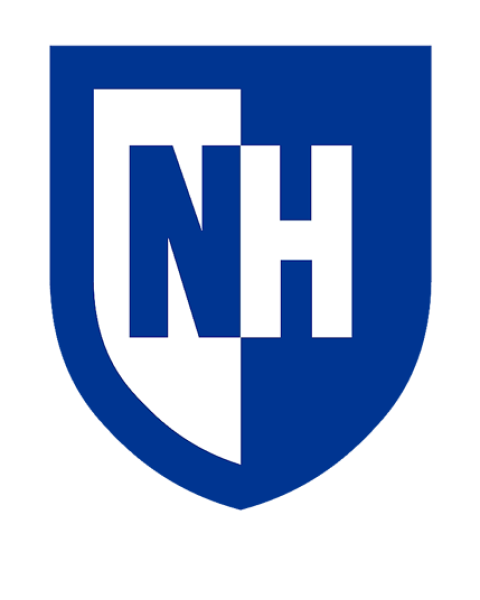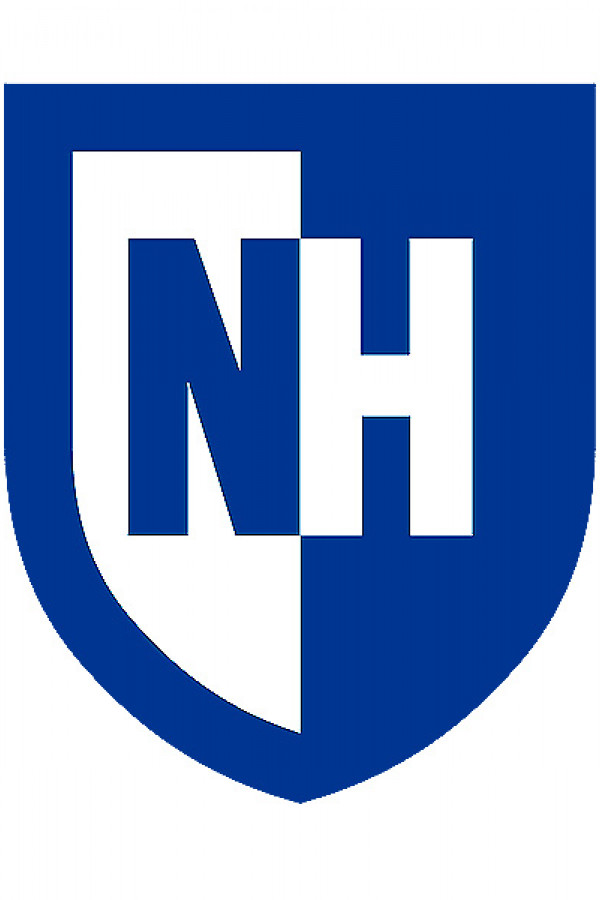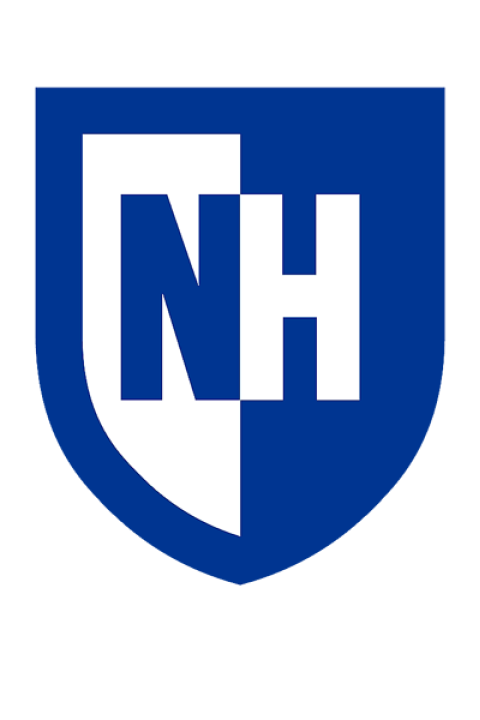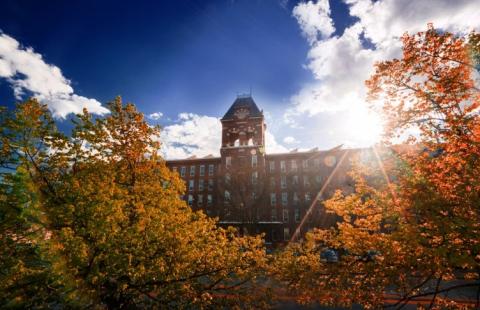We are not admitting students to the English Studies: Literary Studies Major at this time.
What is literary studies?
Literary studies explores literary works, films, media creations and cultural phenomena. Understanding and interpreting literature is multidimensional, taking into consideration the artistic, historical, cultural and theoretical contexts that inform imaginative creations. Literary studies is well suited for students interested in a rewarding career or graduate study in publishing, journalism, education, law and more.
Why study literary studies at UNH Manchester?
Designed to focus on the skills that are central to professional success, our literary studies program emphasizes critical thinking, writing, communication and collaboration through the exploration of English literature, drama, poetry and composition. This program offers courses in areas from graphic novels to crime fiction to film adaptations of literature. As a literary studies major, you’ll explore poetics, literary theory and literary analysis in print and digital literature. The literary studies program culminates with real-world experience through upper-level seminars, capstones and the opportunity for internships tailored to your career ambitions and focused on the applied skills that employers particularly value.
Potential careers
- Business executive
- Copyeditor
- Copywriter
- Critic
- Government consultant
- Journalist
- Lawyer
- Professor
- Publisher
- Writer
Curriculum & Requirements
Beginning in the 2025-2026 academic year, the English Studies: Literary Studies major will no longer be accepting new students. Current English Studies: Literary Studies students will continue to have access to the same high-quality education and resources until they graduate.
Students in the English Studies: Literary Studies program advance their power to analyze keenly and write incisively by studying leading-edge and foundational literary works in print, graphic and digital forms. Gaining a mastery of aesthetics and genre, literary theory and cultural history, our students learn to see how language shapes the world on every scale. English Studies: Literary Studies students take an array of literature classes as well as core courses in digital creative writing and professional and technical communication, making them just the sort of versatile, critically aware graduates prized in workplaces today.
For more information, contact the UNH Manchester Office of Admissions at (603) 641-4150.
This degree plan is a sample and does not reflect the impact of transfer credit or current course offerings. UNH Manchester undergraduate students will develop individual academic plans with their professional advisor during the first year at UNH.
Sample Course Sequence
| First Year | ||
|---|---|---|
| Fall | Credits | |
| UMST 401 or UMST 402 | First Year Seminar or Transfer Seminar | 1-2 |
| ENGL 401 | First-Year Writing | 4 |
| Discovery Course | 4 | |
| Discovery Course | 4 | |
| Elective | 4 | |
| Credits | 17-18 | |
| Spring | ||
| Quantitative Reasoning | 4 | |
| ENGL 419 | How to Read Anything | 4 |
| Discovery Course | 4 | |
| Elective | 4 | |
| Credits | 16 | |
| Second Year | ||
| Fall | ||
| Foreign Language | 4 | |
| ENGL 502 | Professional and Technical Writing | 4 |
| Major Elective | 4 | |
| Discovery Course | 4 | |
| Credits | 16 | |
| Spring | ||
| Foreign Language | 4 | |
| ENGL 595 | Literary Topics (Digital Creative Writing) | 4 |
| Elective | 4 | |
| Discovery Course | 4 | |
| Credits | 16 | |
| Third Year | ||
| Fall | ||
| Any 500 or 600-level ENGL courses in literature, literary theory, poetics, or narrative | 4 | |
| Any 600 or 700-level ENGL electives in literature, literary theory, poetics, or narrative | 4 | |
| Discovery Course | 4 | |
| Elective | 4 | |
| Credits | 16 | |
| Spring | ||
| Any 500 or 600-level ENGL courses in literature, literary theory, poetics, or narrative | 4 | |
| Any 600 or 700-level ENGL electives in literature, literary theory, poetics, or narrative | 4 | |
| Discovery Course | 4 | |
| Elective | 4 | |
| Credits | 16 | |
| Fourth Year | ||
| Fall | ||
| Any 500 or 600-level ENGL courses in literature, literary theory, poetics, or narrative | 4 | |
| ENGL 787 | English Major Seminar | 4 |
| Discovery Course | 4 | |
| Elective | 4 | |
| Credits | 16 | |
| Spring | ||
| ENGL 797 | Special Studies in Literature | 4 |
| Elective | 4 | |
| Elective | 4 | |
| Elective | 4 | |
| Credits | 16 | |
| Total Credits | 129-130 | |
Degree Requirements
All Major, Option and Elective Requirements as indicated.
*Major GPA requirements as indicated.
Major Requirements
For the English Studies: Literary Studies program at UNH Manchester, students must complete a minimum of 128 credits and satisfy the University's Discovery Program and foreign language requirements, and complete a minimum of 40 credits in major coursework with a minimum grade of C-. The major requirements consist of a minimum of 10 courses. These 10 courses (40 credits) must include the capstone requirement.
Students must earn C- or higher in ENGL 419 How to Read Anything, ENGL 502 Professional and Technical Writing, and ENGL 595 Literary Topics in order for these classes to count towards the major.
| Code | Title | Credits |
|---|---|---|
| Core Courses | ||
| ENGL 419 | How to Read Anything | 4 |
| ENGL 502 | Professional and Technical Writing | 4 |
| ENGL 595 | Literary Topics (Digital Creative Writing) | 4 |
| Development/Extension 1 | ||
| Select three courses of the following: | 12 | |
Any 500 or 600-level ENGL courses in literature, literary theory, poetics, or narrative | ||
| Specialization/Practice 1 | ||
| ENGL 787 | English Major Seminar 2 | 4 |
| ENGL 797 | Special Studies in Literature 3 | 4 |
| Select two courses of the following: | 8 | |
Any 600 or 700 level ENGL electives in literature, literary theory, poetics, or narrative | ||
| Total Credits | 40 | |
- 1
Students must take two pre-1800 literature courses in the major. These courses can be taken either in Development/Extension OR Specialization/Practice categories OR from both categories.
- 2
Capstone course. Students must have earned 90 credits before taking the course.
- 3
Variable topic seminar colloquium.
Program Learning Outcomes
Students will be able to:
- Produce clear, compelling, contextually appropriate and well-supported writing.
- Engage with writing as a rhetorical, collaborative, and recursive process from invention to product.
- Demonstrate versatility in writing and speaking within a variety of academic and professional contexts and platforms (including professional and vocational contexts in the form of internships and/ or capstone projects).
- Expertly read and analyze texts--literary and non-literary--from diverse time periods, genres, and authorial perspectives.
- Recognize language as culturally, historically, and socially constructed.
- Adeptly use information literacy and technology skills.
Explore Program Details
-
Associate ProfessorChair, Department of Business and Communication ArtsEmail: Susanne.Paterson@unh.eduPhone: (603) 641-4115
Central to the curricular experience of this program is the requirement to complete either an internship, which places you in a variety of business and organizational settings under the direction of a faculty adviser and workplace supervisor, or a capstone course. Our campus is in the heart of the region’s economic activity — putting unlimited internship opportunities at your feet. We’ve partnered with local businesses to give you the real-world experience that sets you apart. Literary studies majors have interned at many high-profile organizations in the area, including:
- "Best American Experimental Writing"
- Franco-American Centre
- Green Alliance
- Manchester Historic Association
- The Manchester Independent student-run city newspaper
- Mariposa Museum of World Cultures
- New Hampshire Business Review
- New Hampshire Historical Society
- New Hampshire Magazine
The Bureau of Labor Statistics projects positive growth in many professions associated with the literary arts between 2016 and 2026. As a literary studies major, you’ll graduate with a type of expertise and experience that is not just rare, but uncommonly transferable. The skill-sets organizations most covet — the ability to think critically, communicate effectively, and imagine audaciously — are all central to the program, preparing you for a rewarding career or graduate study in publishing, journalism, education, and more.
Our English minor helps you deepen your appreciation of literary analysis, exploring and writing about print, digital and multimedia texts focusing on a variety of periods and themes.
Acquire skills in professional, technical, and cross-disciplinary writing and communication in our professional writing minor, as well as hands-on learning through an internship at a local business or organization. These skills are highly sought-after by employers, regardless of your major.
Acquire the academic skills necessary to teach English to Speakers of Other Languages outside the K-12 school setting. Our TESOL minor helps to lay a foundation for graduate study in Education and ESOL teaching certification, and to work with international communities, whether at home or abroad.
